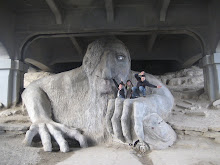Thursday, December 24, 2009
merry christmas!!!
We didn't have a tree, so I made one out of construction paper on the wall. Merry Christmas to all!!!!!!
Monday, December 21, 2009
static no more
Love the old adage "art work is never done" and think it is applicable to websites, which are constantly updated. Successful webpages are not static likes posters, they are real-time. They allow motion around and in and out of the site (links) satisfying the basic needs of the reading audience.
However, websites are often not open and malleable for the internal audience. We perfect for the outer audience not taking into account those who form the organization that a site represents.
For example, a school's website acts as a representative of those who attend the school. Take my alma mater, the VCU Brandcenter - the website is like a poster that you can move about. The students have no way of altering it or adding functions that they desire*. So, it is most useful to outside sources. However, a different school, Yale's school of art is changing the way to look at school webpages. Here's what their page says:
Beautiful. Not what you'd expect from an Ivy League. But constantly a way for that community to be actively recreating itself.
 The background to one page was hilarious. Either someone intentionally put up this message from photobucket, or their account actually ran out.
The background to one page was hilarious. Either someone intentionally put up this message from photobucket, or their account actually ran out.This totally makes sense for the animal that an art school is. The creative work its' students exhibit is what makes it intriguing to other perspective students and the general art community.
*Now let's clarify: I understand why this has become protocol. Due to limited capabilities and resources, we know that a website cannot do everything. However, I don't believe that structuring our thinking about the potential of the web around CURRENT limitations is wise. What is currently impossible will be laughably easy in the future if we find that it is necessary for us to put our brain waves on it.
Monday, December 7, 2009
planning comms based on unemployment
Working on an insurance account and a funny/relevant comms planning idea just occurred to me. We plan communications based on what media vehicle they will roll out in or when a consumer along their journey will encounter the communications. But watching the unemployment rates across the country, would a smart comms plan for something like life insurance or a bank include geography based on unemployment rates?
Think about it, your communications in an area like Detroit, which is still reeling and grasping for jobs needs to be very sensitive to their situation. Northern Virginia on the other hand hasn't been hit as hard thanks to the number of government jobs that are held in the area. Communications in that geography for a national bank would be vastly different.
A map showing unemployment rates across the country:
Think about it, your communications in an area like Detroit, which is still reeling and grasping for jobs needs to be very sensitive to their situation. Northern Virginia on the other hand hasn't been hit as hard thanks to the number of government jobs that are held in the area. Communications in that geography for a national bank would be vastly different.
A map showing unemployment rates across the country:
Tuesday, December 1, 2009
will wave be the new twitter?
Twitter has been overrun by spammer crap. Meaning that users will get fed up and head elsewhere. Another problem that I've been having with Twitter is that I can't converse/reply to Tweets unless I have direct messaging open with someone. I don't want to bug those who follow me with short replies to friends. Lists have helped us find Tweets that are most useful/catered to a particular purpose.
But with Wave I can have conversations with friends and the convos are as private or open as I want them to be. All of my Waves are saved and quickly accessible so the convo can start/stop whenever I feel like adding to it. I can write notes to friends for them to read at a later time (yeah, like an email) and it's all within the same Wave.
I kind of see public Waves as a combo of old aol-style chat rooms and Twitter-lists. They can be catered to a specific interest - I'm in the "planner wave" and anyone in the world can join. But with the use of profiles and the links that people post to their multi-faceted web-presence, it's less creepy than a chat room.
Could Wave some day replace Twitter? Seems unlikely, but then again...
I have a few invites to the Wave, if you'd like one leave me your gmail address.
But with Wave I can have conversations with friends and the convos are as private or open as I want them to be. All of my Waves are saved and quickly accessible so the convo can start/stop whenever I feel like adding to it. I can write notes to friends for them to read at a later time (yeah, like an email) and it's all within the same Wave.
I kind of see public Waves as a combo of old aol-style chat rooms and Twitter-lists. They can be catered to a specific interest - I'm in the "planner wave" and anyone in the world can join. But with the use of profiles and the links that people post to their multi-faceted web-presence, it's less creepy than a chat room.
Could Wave some day replace Twitter? Seems unlikely, but then again...
I have a few invites to the Wave, if you'd like one leave me your gmail address.
Subscribe to:
Posts (Atom)












